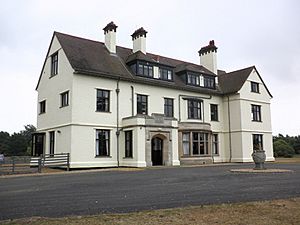Tranmer House facts for kids
Quick facts for kids Tranmer House |
|
|---|---|
 |
|
| Type | House |
| Location | Sutton Hoo, Woodbridge, Suffolk |
| Built | 1910 |
| Architect | John Shewell Corder |
| Architectural style(s) | Tudor Revival |
| Owner | National Trust |
| Lua error in Module:Location_map at line 420: attempt to index field 'wikibase' (a nil value). | |
Tranmer House is a historic country house in Sutton Hoo, England. It was built in 1910. This house is special because it sits on top of the famous Sutton Hoo Anglo-Saxon burial grounds. In 1938, a woman named Edith Pretty lived here. She hired an archaeologist, Basil Brown, to dig up some ancient burial mounds on her land. In May 1939, Basil Brown made an amazing discovery: a ship burial! This was one of the most important archaeological finds ever. Today, the National Trust owns Tranmer House.
The Story of Tranmer House
Tranmer House was first called Sutton Hoo House. It was designed in 1910 by John Shewell Corder. He was an architect from Ipswich. The house was built for a Suffolk artist named John Chadwick Lomax.
Edith Pretty and the Great Discovery
In 1926, Edith Pretty and her husband, Frank, bought the Sutton Hoo estate. Edith Pretty inherited a lot of money from her father. After her husband died in 1934, Edith became very interested in the ancient burial mounds. These mounds were located near Tranmer House.
She decided to hire a local archaeologist, Basil Brown. He started digging in 1938 and continued in 1939. During his second dig, Basil Brown found something incredible. He discovered a huge Anglo-Saxon ship burial site. It was hidden under Mound 1. This was the largest Anglo-Saxon ship burial ever found! Inside, there was a chamber full of amazing treasures. It became known as "the richest intact early medieval grave in Europe."
Tranmer House Today
Edith Pretty passed away in 1942. Before she died, she gave the amazing Sutton Hoo treasure to the British Museum. Her son's family sold the house in the late 1940s. Different farming families owned it for a while. Later, the Tranmer family bought it.
After Annie Tranmer died in 1998, she left the house and the Sutton Hoo burial site to the National Trust. The Trust then renamed the house "Tranmer House" to honor her gift.
The house is now a museum. Visitors can learn all about the history of Sutton Hoo. The old stable block and squash court are now part of the Sutton Hoo Visitor Centre. In 2000, another Anglo-Saxon cemetery was found. It was right under the rose garden!
 | Bayard Rustin |
 | Jeannette Carter |
 | Jeremiah A. Brown |

